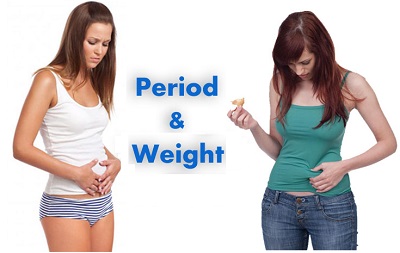The menstrual cycle, though grueling sometimes, is important. Every 28 days, women go through emotional changes, hormonal changes and periods. This is an indication that they are not pregnant. What if the cycle is interrupted? What if you are not expecting, but you miss your periods suddenly? A number of things could cause this. Here comes the question "Can weight loss be one of the things affecting your period?"
Can Weight Loss Affect Your Period?
Progesterone and estrogen are the two main hormones that affect a woman’s menstrual cycle. Estrogen helps to mature the egg before ovulation and to grow and mature the uterine lining. Progesterone, on the other hand, mainly controls the uterine lining buildup and helps mature and maintain the uterine lining during pregnancy. If pregnancy does not occur, the level of progesterone falls and the uterine lining sheds as menstruation.
So, can weight loss affect your period? Too much weight loss can cause you to miss your periods. Loss of weight either due to dieting or eating disorders can cause fluctuations in the thyroid gland, which in turn leads to a reduction of these reproductive hormones. This will result in the absence of menstruation, a condition called secondary amenorrhea. Amenorrhea can be caused by losing more than 10% of your ideal body weight within a short period of time. This means losing 12 pounds may lead to missed periods for a person whose ideal weight is 120 pounds.
Women who are underweight do not produce enough estrogen. Besides, your cells are unable to convert cholesterol into estrogen if you lack enough fat. Remember, you require enough estrogen to build the uterine lining and have your periods. So women with less fat in their bodies are likely to get fewer periods or stay longer without ovulation.
Can Weight Gain Affect Your Period?
Can weight loss affect your period? Yes. What about weight gain? The answer is still yes. But how does this occur? A weak estrogen called estrone can be formed from basic cholesterol compounds found in fat cells. Obese or overweight women with extra fat cells have little estrone-forming units that have an estrogenic effect on glands. This extra estrogen may lead to menstrual disorders. A woman with extra weight may go for months without ovulating although the uterine lining keeps accumulating. It gets to a point where the lining becomes unstable. Consequently, a woman can experience a period that lets loose like a flood gate with very heavy or prolonged bleeding.

Does Period Affect Your Weight?
A woman’s menstrual cycle can be affected by either weight gain or weight loss. However, the opposite may also happen. It may often feel like you have put on some weight during that time of the month. However, menstruation may be not the cause of changes in weight. As much as there may be secondary connections of menstrual cycle to weight gain or loss, there is no direct impact.
Premenstrual syndrome (PMS) comes with food cravings and changes in appetite, which could affect weight. Studies have shown that women will consume more calories during different phases of the menstrual cycle. They tend to crave foods with high carbohydrate and fat content during periods. Some women also experience bloating, a temporary PMS symptom, which makes them feel heavier. Salty foods can cause water retention in the body, which depicts temporary weight gain on the scale. It is important to keep off very salty foods during and after your period. Eat healthy by including plenty of fruits and vegetables in your diet. Take lots of water to reduce the bloated feeling.
Other Factors That Can Affect Your Period
Can weight loss affect your period? Yes, it can. And there are many other things can interfere with your period other than weight:
- Medication: Medications sometimes interfere with your menses. Always confirm with your pharmacist whether missing your periods is one of the side effects of any medications.
- Stress: Your regular menstrual cycle and evolution can be messed up by high stress levels. Delayed ovulation may lead to late periods. You may lose your period if you do not ovulate at all.
- Exercise: Low body fat or stress on your body caused by strenuous exercise may interfere with your menstrual cycle.
- Thyroid Disease: An underactive thyroid (hypothyroidism) can alter the production of certain hormones and result in missed periods.
- Changes In Shift: If you suddenly change your work shift from night to day or your work involves constant changes in shift, there may be a change in your menstrual cycle.
- Breastfeeding: Hormones that aid in milk production can sometimes block ovulation or interfere with your cycle eventually causing you to stop menstruating.
- Contraceptives: Irregular periods can also be due to the use of contraceptives. Some contraceptives change your flow so that it looks like you have missed your periods while others like Yaz or Seasonique stop your periods for a few months or up to one year.
- Antidepressants Or Antipsychotics: Antipsychotic medications and antidepressants increase the production of prolactin hormone, which interferes with other hormones that regulate your cycle leading to skipped or more frequent periods.
- Smoking: Smoking may change the levels of progesterone, estrogen, testosterones and other hormones that regulate your cycle. Women who smoke experience much worse PMS and have shorter and more irregular cycles than those who do not smoke.
- Other Factors: Other factors that can cause irregular or missed periods include, pelvic organ problems like Asherman’s syndrome or imperforate hymen polycystic ovary syndrome, birth control methods, travel, illegal drug use, hormonal problems interfering with the hormones that support menstruation, premature ovarian failure which may be caused by radiation therapy, chemotherapy or surgery on the abdomen or pelvis and diseases like liver disease, tuberculosis, diabetes and irritable bowel syndrome.
